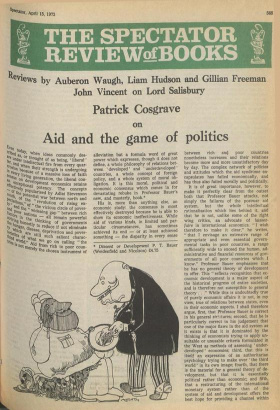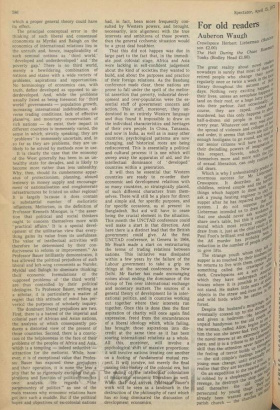Re views by Auberon Waugh, Liam Hudson and Gillian Freeman
John Vincent on Lord Salisbury
Patrick Cosgrave
on
Aid and the game of politics
,4rth.en d today, when ideas commonly des: are as, or thought of as being, liberal ,re under intellectual fire from every ' quar_ °81°o be e` r , ,a rid when their strength is undergoing cause of a massive loss of faith r,,, *everstls Y living generation, the liberal con a,-" on development economics retains cuectively exce Th ptional potency. e concepts th Popularised by Adlai Stevenson --:°f e potential war between north and p'uellth,. of the " revolution of rising exOf "the vicious circle of poveraild and the " widening gap" between ric h " i fa P°cIr nations — all remain powerful st'''c!rs hi the thinking of governments threivi.1.11g honestly to reduce if not eliminate vl ty '11hger, disease, deprivation and poverteri Which are still such salient charac,, . sties ltrItilertl.World.', of What we go on calling "the Aid from rich to poor coun's ls not merely the chosen instrument of alleviation but a formula word of great power which expresses, though it does not define, a whole philosophy of relations between 'developed' and 'underdeveloped' countries, a whole concept of foreign policy, and a whole system of moral obligation. It is this moral, political and economic consensus which comes in for devastating rebuke in Professor Bauer's new, and masterly, book.* His is, more than anything else, an economic study: the consensus is most effectively destroyed because he is able to show its economic ineffectiveness. While aid of various kinds, in limited and particular circumstances, has sometimes achieved its end — or at least achieved something — the disparity in every sense between rich and poor countries nonetheless increases and their relations become more and more unsatisfactory day by day. The complex network of policies and attitudes which the aid syndrome encapsulates has failed economically, and has thus also failed morally and politically.
It is of great importance, however, to make it perfectly clear from the outset both that Professor Bauer attacks, not simply the failures of the postwar aid system, but the whole intellectual rationalisation which lies behind it; and that he is not, unlike some of the right wing critics, an advocate of laissezfaire in international economics. "I wish therefore to make it clear," he writes, "that I envisage an extensive range of appropriate and even essential governmental tasks in poor countries, a range sufficiently wide to exceed the human, administrative and financial resources of governments of all poor countries which I know." Professor Bauer emphasises that he has no general theory of development to offer. This "reflects recognition that economic development is a major aspect of the historical progress of entire societies, and is therefore not susceptible to general theory . . ." While this is undoubtedly true of purely economic affairs it is not, in my view, true of relations between states, even in their economic aspects. I shall therefore argue, first, that Piofessor Bauer is correct in his general strictures; second, that he is • particularly correct in his judgement that one of the major flaws in the aid system as it exists is that it is dominated by the thinking of economists trying to apply unsuitable or unusable criteria formulated in the West as methods of assessing 'underdeveloped' economies; third, that this is itself an expression of an authoritarian psychology trying to make over 'the third world ' in its own image; fourth, that there is the material for a general theory of development, but that it is essentially political rather than economic; and fifth, that a restructuring of the international monetary system rather than of the system of aid and development offers the best hope for providing a channel within
which a proper general theory could have its effect.
The principal conceptual error in the thinking of such liberal and consensual economists as Myrdal and Balogh on the economics of international relations lies in the untruth and, hence, inapplicability of such seminal notions as 'third world,'
developed and underdeveloped' and the poverty gap.' There is no third world, merely a bewildering combination of nations and states with a wide variety of problems, aspirations and opportunities. No terminology of economics can, with truth, define developed as opposed to underdeveloped. And, while the problems usually listed as being foremost for third world' governments — population growth, increasing international indebtedness, adverse trading conditions, lack of effective planning, and monetary conservatism of rich nations — do exist, their impact in different countries is immensely varied, the sense in which, strictly speaking, they are 'problems' is immensely uncertain, and, in so far as they are problems, they are unlikely to be solved by methods now in use.
It is clearly the case that the economy of the West generally has been in an unhealthy state for decades, and is likely to become more rather than less unhealthy. Why, then, should its cumbersome apparatus of protectionism, planning, absurd leniency in money supply and encouragement of nationalisation and conglomerate infrastructures be fcisted on other regions? It is largely because it does contain a substantial number of melioristic influences. Meliorism, in the definition of Professor Kenneth Minogue, is "the assertion that political and social thinkers ought to concern themselves more with practical affairs.' It is a special development of the utilitarian view that everything gains its value from its usefulness. The value of intellectual activities will therefore be determined by their conduciveness to reform or improvement." As Professor Bauer brilliantly demonstrates, it has allowed the political prejudices of such liberal and left-wing economists as Nurske, Myrdal and Balogh to dominate thinking: their economic formulations of the 5upposed problems of 'the third world' are thus controlled by their political ideologies. To Professor Bauer, writing as a scholar, it is particularly a matter of regret that this attitude of mind has perverted the purposes of scholarly inquiry.
The dominant liberal prejudices are two. First, there is a hatred of the imperial and colonial past of African and Asian nations, the analysis of which consequently produces a distorted view of the present of those countries. Second, there is a conviction of the helplessness in the face of their problems of the peoples of Africa and Asia, which is a tempting — indeed seductive attraction for the meliorist. While, however, it is of exceptional value that Professor Bauer has exposed these ilvejudices and their operation, it is none -the less a
pity that he so rigorously exclud* the aspirations and function of politics'ffrom his own analysis. He regards " the paramountcy of politics" as one of the main reasons why economic relations have got into such a muddle. But if the political hopes and objectives of ex-colonial nations had, in fact, been more frequently consulted by Western powers, and brought, necessarily, into alignment with the true interests and ambitions of those powers, then the general eco`nomic situation would be a great deal healthier.
That this did not happen was due in large part to the fact that, in the immediate post colonial stage, Africa and Asia were lacking in self-confident judgement about the kind of societies they wanted to build, and about the purposes and practice of their foreign relations. As the Bandung conference made clear, these nations are prone to fall under the spell of the meliorist assertion that poverty, industrial development and over-population were the essential stuff of government concern and action. This stuff, moreover, they understood in an entirely Western language and thus found it impossible to draw on the individual characteristics and heritages of their own people. In China, Tanzania, and now in India, as well as in many other countries, psychological patterns are now changing, and historical roots are being rediscovered. This is essentially a political and cultural process: it is one which will sweep away the apparatus of aid, and the intellectual dominance of ' developed' countries within a generation.
It will then be essential that Western countries are ready to re-order their economic and development relations with so many countries, so strategically placed, of such different characters from themselves. There will still be a place for direct and simple aid, for specific purposes, and for specific occasions, as at present in Bangladesh. But aid will have to cease being the crucial element in the situation. This month the UNCTAD conference could well make a start in that direction. And here there is a distinct lead that the British government could give. At the first UNCTAD conference, in Geneva in 1964, Mr Heath made a start on restructuring the terms of trading relations between nations. This initiative was dissipated within a few years by the failure of the Labour government to take a grip on things at the second conference in New Delhi. Mr Barber has made encouraging noises about ending the dominance of the Group of Ten over international exchange and monetary matters. The sources of a general theory of development lie in international politics, and in countries working out together where their interests run together. Once this is done then the finer aspiration of charity will once again find expression, freed from the encumbrances of a liberal ideology which, while failing, has brought those aspirations into discredit at the same time as it has been souring international relations as a whole. All this, moreover, will involve a psychological shift of massive proportions: it will involve nations treating one another on a footing of fundamental mutual respect. It will involve, not merely the final passing into history of the colonial era, but the eficling of the intellectual colonialism of rnelioristic economic liberalism as well. Whe'n that day arrives PfOfessoeBauer's , work will be seen as a landmark in the Sit destruction of the philosophy of cant which has so long dominated the discussion of development economics.



































 Previous page
Previous page